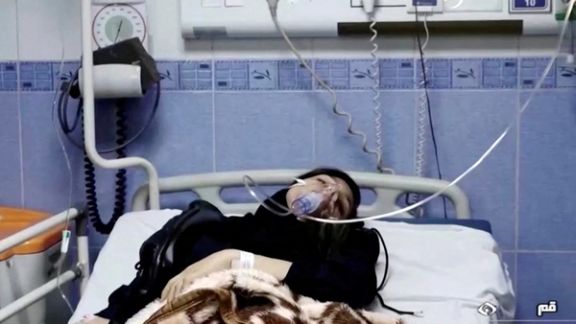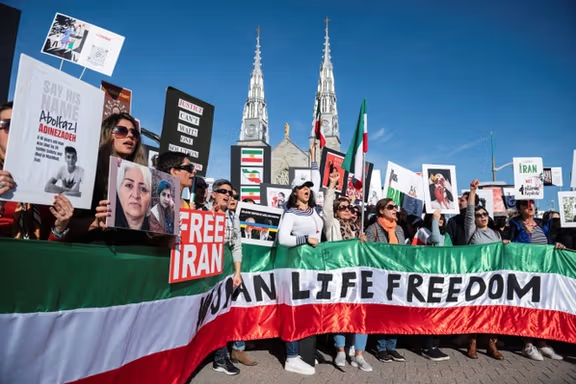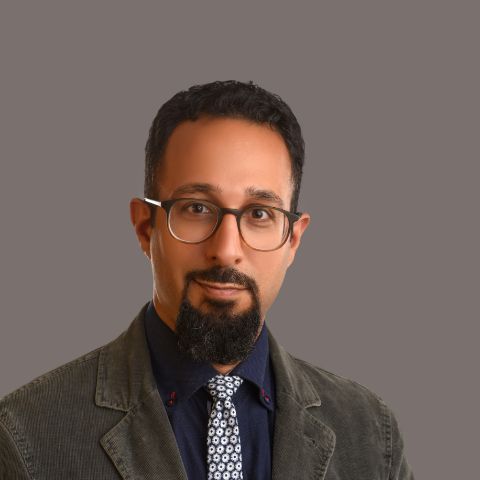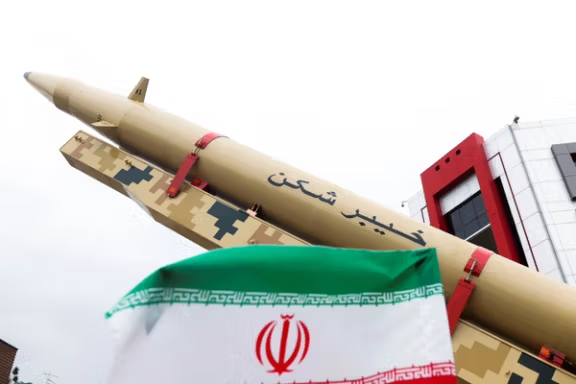More Female High School Students Poisoned In Iran

Just two weeks after the new school year began in Iran, more high school girls have been poisoned. This time, it happened in a girls' high school in west Tehran.

Just two weeks after the new school year began in Iran, more high school girls have been poisoned. This time, it happened in a girls' high school in west Tehran.
On Saturday, a video started circulating on social media, showing students from Ashura High School in the Sahr-e Qods district of Tehran rushing out of their school with worried parents, onlookers, and ambulances present.
The Hengaw Organization for Human Rights, a monitoring group, said many of the sick students had to be taken to hospitals urgently.
The poisonings have been happening mainly in girls' schools across Iran since last November. They began during Woman, Life, Freedom protests and have been going on until April 2023.
The first case was reported in the city of Qom, and then it spread across the country with many students ending up in hospitals, and at least one death.
Some believe regime hardliners or religious extremists might be behind the attacks. They might be doing it to punish girls who are speaking out against the regime during protests. Some even call these attacks "state terrorism."
The government, though, is trying to make it seem less serious, without pursuing the case or detaining any perpetrators. They say students get sick from stink bombs and pepper sprays, which some students use to disrupt classes.

Barely a day after she won the Nobel Peace Prize, imprisoned human rights activist Narges Mohammadi has been targeted by ultra-hardline media in Iran.
Mohammadi has been arrested and sentenced around a dozen times in the past decade or so. Still, she has been unrelenting in her fight for democracy and human rights in Iran. She was in prison when the Nobel committee announced her as winner on Friday.
On Saturday (first day of the week in Iran) ultra hardline dailies, including those affiliated with the IRGC, attacked Mohammadi in what seemed to be a concerted effort.
“Criminals Award a Separatist, pro-Sanction Iranian,” headlined the IRGC-affiliated Javan. The daily, Jam-e Jam, owned by the state broadcaster, was slightly subtler: “For Nobel, Against the nation.” Farhikhtegan, another morning paper firmly advocating the regime’s hardline stance, had even a shorter headline: “Nobel for Shamelessness.”
The attack-lines were, of course, not new.
The Islamic Republic and its mouthpieces have always tried to blame the ‘enemy’ for all the country’s ills. A constant in the narrative is the ‘sellout activist’ – who takes money and guidance from the West and acts against the interests of her own ‘people’.
Narges Mohammadi has spent the better part of the last decade in prison. In total, she’s been sentenced to 31 years in prison and 154 lashes. She hasn’t been able to see her children since 2015, when they migrated to France with their father, political activist and former political prisoner, Taghi Rahmani.
Speaking shortly after his wife was named the 2023 Nobel Laureate, Rahmani said the award had been given to her “as a symbol” of the Women Life Freedom movement.”
The Nobel Committee said it was awarding the Peace Prize to Mohammadi “for her fight against the oppression of women in Iran and her fight to promote human rights and freedom for all.”
The announcement was met by near universal glee, from the White House to the streets of Tehran. The regime, however, was quick to denounce the prize and offer its alternative reality.
“The worthiest symbol of world peace was Qassem Soleimani,” declared the Foreign Minister of the Islamic Republic, exhibiting once more the unbridgeable gulf between those who rule over and those who live in Iran.
Soleimani was a notorious military and intelligence operative who created and nursed various militant groups in the Middle East until he was killed in a US drone strike in 2020.
Mohammdi is only the second Iranian to win the Nobel Peace Prize. Human rights lawyer Shirin Ebadi won it exactly twenty years ago, in 2003. Ebadi founded the Defenders of Human Rights Centre in 2001. Mohammadi served as the Centre’s deputy head and spokesperson.
Ebadi was one of the first Iranian figures to congratulate Mohammadi: “She truly deserved this prize. She has dedicated his life to fighting for freedom, equality, and protecting human rights. And today… she is behind bars.”

The Iranian government has extended congratulations to the Hamas terror group for its recent attacks on Israel, which resembled a formal and large-scale terror raid.
Naser Kanaani, the spokesperson for the Ministry of Foreign Affairs of the Islamic Republic, stated that the "operations conducted today have marked a new chapter in the realm of resistance and armed actions against occupiers."
In 1984, Iran was designated as a State Sponsor of Terrorism, and it has since persisted in its backing of activities associated with terrorism. This support includes assistance to Hezbollah, Palestinian terrorist factions in Gaza, as well as multiple terrorist and militant organizations operating in Iraq, Syria, and Bahrain.
Kanaani said, "Today's events are consistent with the ongoing successes of the anti-Zionist resistance movement across various regions, including Syria, Lebanon, and the occupied territories."
Iranian officials commonly use the term "Zionist regime" when referring to Israel.
The Iranian regime has also displayed billboards in Tehran's Palestine Square expressing support for the attacks on Israel, with a rough translation of the billboard reading "Storm of Rockets."
Additionally, members affiliated with the Basij, an IRGC-linked militia organization, distributed sweets and juice in the streets and at the University of Qom to celebrate the attacks.
Such actions have taken place amid strong condemnation from world leaders regarding the terror attack, which resulted in the deaths of at least 100 Israeli civilians and the injury of hundreds more.
Meanwhile, Iran’s Islamic Propaganda Organization, has announced its plan to organize government-sponsored celebrations in the streets of Tehran and other Iranian cities.

Iranian regime officials, parliament and state media have expressed their support for Hamas' large-scale attack on Israel, killing scores of civilians.
During their open session on Saturday, members of the Iranian Parliament showed their support for the militant incursion into Israel by chanting slogans, such as, "Palestine Will Win, Israel Will Be Destroyed."
Yahya Rahim Safavi, the former commander of the Islamic Revolutionary Guard Corps and military advisor to Iran’s Supreme Leader Ali Khamenei, also voiced his support for the terror group’s attack. He pledged “solidarity with Palestinians until the liberation of Palestine and Jerusalem.”
According to semi-officials ISNA news agency, he extended congratulations to Hamas forces and asserted that Former IRGC Quds Force Commander "Qassem Soleimani is undoubtedly with the mujahideen." However, he did not elaborate on how Iran's support for Hamas would manifest itself in the ongoing military conflict with Israel.
Earlier in the week, Iran's Supreme Leader, Ali Khamenei, criticized countries normalizing relations with Israel, characterizing it as a risky endeavor. He asserted that " The position of the Islamic Republic is that countries that make the gamble of normalization with Israel will lose. They are betting on a losing horse."
Media outlets associated with the Iranian regime have also embraced the news of Hamas's attack on Israel. Tasnim News Agency, affiliated with the IRGC, described Hamas's operation as a "significant blow to Israel" and touched upon the extensive number of Israeli casualties.
Likewise, IRNA, the official state news agency of the Islamic Republic, characterized Hamas's attack as "comprehensive," "complex," and "surprising." IRNA also noted that Hamas utilized drones during the attack to target Israeli positions.
Iranian-backed Palestinian Hamas launched a coordinated and large attack on Israel on Saturday, resulting in the loss of at least 40 Israeli lives and leaving over 500 people injured so far.

A grassroots group of lawyers and concerned Iranians in Canada is working to disrupt Iranian government influence operations in the country with the community’s help.
StopIRGC’s efforts, however, are insufficient to shut the open path the clerical regime in Tehran has managed to build into Canada. The Canadian government must take action, Mojedeh Shahriari, a cofounding member, told Iran International.
Since the death of Mahsa Amini in the hands of morality police in Tehran in September 2022, the coalition of lawyers has been trying to do its part to track the Islamic Republic’s agents, who spy on anti-regime activists, intimidate participants at "Woman, Life, Freedom" demonstrations and engage in money laundering and sanctions evasion on Canadian soil.
Shahriari described the Islamic Republic’s network in Canada as “similar to an international drug cartel”. She warned that they are even more dangerous than common criminals as they also try to make inroads into political and cultural spheres by influencing Canadian politicians at municipal, provincial and federal levels, as well as rallying Muslims in favor of their objectives through regime-linked Islamic centers.

Ramin Joubin, another StopIRGC cofounder, told Iran International that the group is hot on the heels of regime-related activities through at least four mosques in Alberta, Ontario and British Columbia.
The voluntary group is dependent on public reports about related suspicious activities, submitted by the Iranian community in Canada. According to Shahriari, the group “keeps receiving tips”, which they fact-check and subsequently use as basis of reports they prepare to send to authorities such as the police as well as immigration or border security in Canada.
“The reports people send us keep coming and our work is wholly dependent on those. Sometime sent anonymously, they provide a clue for us to pursue the cases,” she added.
The StopIRGC initiative, which officially started on a zero budget in 2022, has been welcomed by Iranian Canadians, “who have shown willingness in tracking, helping to expel” regime agents, said Shahriari.
The group's co-founder expressed satisfaction with law enforcement agencies such as the Royal Canadian Mounted Police (RCMP), which has been "relatively cooperative" with StopIRGC and has shown interest in their work. However, she criticized the government of Prime Minister Justin Trudeau for not providing sufficient support to a group dedicated to raising awareness about "this serious security issue" in Canada.
“There is no indication of the Canadian government’s resolve to even address this security threat,” Shahriari said. “I hope at least they raise RCMP’s budget so they can investigate Iranian spies in Canada, whether with our help or independently.”
Taking suspected individuals to court is specifically challenging due to privacy laws in Canada and the fact that many of them are already Canadian citizens, Joubin said.
“More than 50 percent of those we are investigating are already Canadian citizens, which makes pursuing the matter more challenging,” he said.
Shahriari also asserted that those suspected of working for the Iranian regime are “more daring than you would expect as their pockets are full of money,” which emboldens them when it comes to legal cases such as the ones StopIRGC is pursuing.

One relevant case being independently pursued by a lawyer associated with StopIRGC involves the defendant using intimidation tactics against the plaintiff, who is now a Canadian citizen living in the US, in an attempt to halt legal proceedings.
The ongoing legal case in Calgary initially revolved around the defaulting of an 18-bitcoin debt borrowed by an Iranian owner of an exchange shop in Canada. However, as the plaintiff and their lawyer delved deeper into the matter in their pursuit to recover the money, they started uncovering what they allege to be a money laundering operation with connections to the Iranian regime. The plaintiff shared these details with Iran International on the condition of anonymity.
The defendant, whose father used to work in the oil sector during former President Mahmoud Ahmadinejad’s government, is just a benchman in a group of more powerful people allegedly working for the regime, the plaintiff believes.
Joubin, who is aware of some details of the case, said there are serious accusations of money laundering, sanctions evasion, and intimidation and that the defendant has filed for bankruptcy, a claim that Canadian authorities have already debunked.
The case is an instance of many other civil, defamation, criminal, and even family cases StopIRGC is looking into. The group is planning to release more details about their work this month.
StopIRGC cofounders asserted that following up on such legal procedures is a lengthy process, particularly when it comes to the more immediate dangers the regime’s network poses, such as infiltration into Iranian dissident factions in Canada.
Despite all the efforts in its one-year history, StopIRGC has not yet managed to help expel any regime agents, yet the members hope that their increasingly growing database would some day pave the way in abolishing the Islamic Republic’s foreign interference in Canada.

The group is already investigating multiple people suspected of working for Iran’s regime, who have shown up at protests to intimidate protesters and gather intelligence on the crowd, which is a common practice by the Islamic Republic, and well known by the Iranian diaspora across the world.
“There is this one case I’m investigating about a suspected person who showed up at an anti-regime protest in Vancouver and even spoke to the crowd in the guise of a dissident,” Shahriari said, stressing that these agents know how to dress and behave not to be mistaken as regime sympathizers.
According to the cofounders, the dissidents are intimidated via a series of tactics including stalking, trespassing into their properties and sometimes direct physical assault. The scale and scope of such threats are not only limited to Canada as the dissidents’ relatives are targeted inside Iran to exert pressure on them.
The threats posed by Iran’s regime might not seem immediate, Shahriari said, but the Islamic Republic and the IRGC are “a terrorist threat to the whole world and their presence here is guaranteed to cause serious troubles in Canada sooner or later”.
Some Canadian politicians have already made efforts to proscribe the IRGC, including in the Senate following numerous calls by Iranian activists, warning about the dangers they pose to Canadians.
In July 2022, Trudeau said Canada has designated IRGC leadership in response to crackdown on popular protests in Iran, yet activists have been signaling that the measure is insufficient.
While StopIRGC remains influential in lessening the risks and raising awareness about the issue, it does not have the means to deal with all the agents “who keep arriving in Canada”, Shahriari said, voicing hope that the next government would finally take on the task of proscribing the Guards as a terrorist entity.
Pierre Poilievre, the leader of Canada’s Conservative Party, running to be the next prime minister, vowed in late August to “kick out” IRGC if he wins office.
“If IRGC is listed as a terrorist organization, police will be obliged to take them on, and they will be tried as members of a terror organization. That should be the main effort,” Shahriari said, adding, “Meanwhile, all we can do is to investigate them further and continue to put pressure on the Trudeau government to take action against the IRGC and other Islamic Republic's agents in Canada.”

The EU said in a statement that Britain, France, and Germany do not intend to lift the sanctions against Iran, which were supposed to expire on October 18th.
Josep Borrell, the European Union's Foreign Policy Chief, announced in a statement on Friday that he has received a letter from the foreign ministers of France, Germany and the United Kingdom informing him about an issue concerning the implementation of Iran’s commitments under the Joint Comprehensive Plan of Action (JCPOA).
“The Foreign Ministers stated that Iran has been in non-compliance since 2019 and considered that this has not been resolved through the JCPoA’s Dispute Resolution Mechanism (DRM). They expressed their intention not to take the steps regarding the lifting of further sanctions on JCPoA Transition Day on 18 October 2023,” reads the statement.
Borrell's reference is to one of the sunset clauses of the JCPOA, according to which on October 18, the sanctions imposed by the European Union against Iran, which included missile and arms sanctions, were supposed to be lifted.
Based on Annexes of UN Security Council Resolution 2231, the European Union had agreed to lift the sanctions on Iran in the eighth year of the JCPOA's implementation.
One year after former US President Donald Trump decided to unilaterally withdraw from the JCPOA and impose sanctions on Tehran, Iran gradually stepped away from its commitments within the framework of the JCPOA by increasing the level of uranium enrichment.
Negotiations to revive the JCPOA, aimed at bringing Iran to its commitments within the agreement, came to a halt last year without results. After the failure of the talks, the United States accused Iran indirectly of non-JCPOA-related demands.